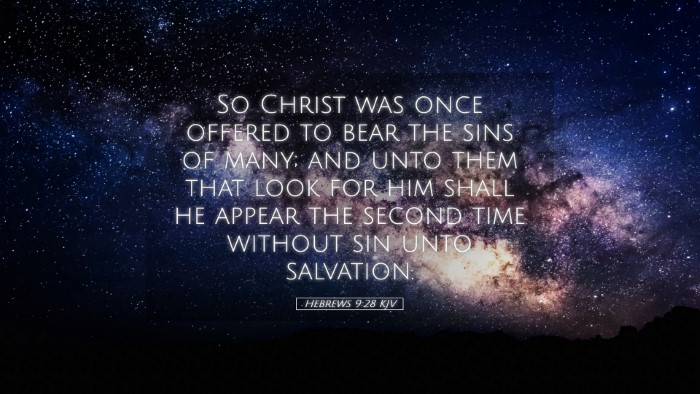Commentary on Hebrews 9:28
Verse: "So Christ was once offered to bear the sins of many; and unto them that look for him shall he appear the second time without sin unto salvation."
This verse encapsulates the dual aspects of Christ’s ministry—His sacrificial offering and His promised return. Rich theological insights emerge from various public domain commentaries, revealing the depth of this passage in its implications on salvation and the believer's hope.
Exegesis and Theological Implications
Hebrews 9:28 makes a profound statement about the nature of Christ's sacrifice and His second coming. The verse contrasts the once-for-all sacrifice of Christ with His future advent, setting the foundation for understanding redemption and eschatology.
Matthew Henry’s Insight
Matthew Henry emphasizes the completeness of Christ’s sacrifice. He notes that during the first advent, Christ came to "bear the sins of many." This bearing signifies not just acknowledgment but an actual taking away of sin, fulfilling the requirements of the law. Henry articulates that the phrase "once offered" denotes the finality and sufficiency of Christ’s death. Unlike the repeated sacrifices of the Old Testament, Christ's sacrifice was singular and perfect.
Moreover, Henry highlights the latter part of the verse regarding "looking for him." He interprets this as an encouragement for believers to remain vigilant and steadfast in faith, cultivating a hopeful expectation of Christ's return, which will be devoid of any association with sin—an event that will culminate in the ultimate salvation of those who await Him.
Albert Barnes’ Perspective
Albert Barnes focuses on the doctrinal implications of Christ’s sacrifice, stating that He bore the sins of mankind as a central pillar of Christian faith. Barnes clarifies that the "many" mentioned refers to all who believe, suggesting an inclusive scope of salvation to all who have faith in Christ. He advocates for an understanding of "bearing sins" not merely as a legal transaction but as a personal, redemptive act that impacts the believer’s life and relationship with God.
Furthermore, Barnes discusses the concept of Christ appearing "the second time." He argues that unlike His first coming, which involved humiliation and suffering, His second coming will be marked by glory and judgment. This expectation serves as both comfort and admonition, reminding believers to live in a manner that is fitting for those who anticipate the return of their Savior.
Adam Clarke’s Analysis
Adam Clarke provides a historical context to the epistle, noting that the audience was primarily composed of Jewish converts who struggled with the transition from the Old Covenant to the New. Clarke emphasizes the significance of the verse in addressing their concerns about the sacrificial system and the finality of Christ’s work. He points out that the author of Hebrews reassures them that there is no need for further sacrifices since Jesus’ one-time offering was sufficient for eternal redemption.
Clarke also elaborates on the phrase "without sin." He opines that this refers not only to Christ’s sinless nature but also indicates that His second coming will not involve the sin He bore during His first advent. Instead, His return signifies the consummation of redemption, where sin’s power will be fully vanquished, and righteousness will reign.
Practical Applications for Believers
The insights from these commentators provide significant applications for contemporary believers:
- Sustained Faith: The admonition to "look for him" calls for a sustained faith and active anticipation of Christ's return, encouraging believers to live holy lives in the light of this hope.
- Understanding Redemption: Grasping the completeness of Christ's sacrifice fosters a deeper appreciation for the grace that believers receive, allowing them to rest in the sufficiency of Christ’s work.
- Living Correctly: The promise of Christ’s return should prompt believers to engage in ethical living, sharing the gospel and exemplifying kingdom values in a world that often strays from them.
Conclusion
Hebrews 9:28 serves as a cornerstone for understanding both the nature of Christ and the believer’s hope. By synthesizing the insights from Matthew Henry, Albert Barnes, and Adam Clarke, it becomes evident that Christ's singular sacrifice and His promised return are foundational truths that inform a believer's faith and practice. The profound implications of this verse encourage a life characterized by hope, righteousness, and active perseverance in faith.


